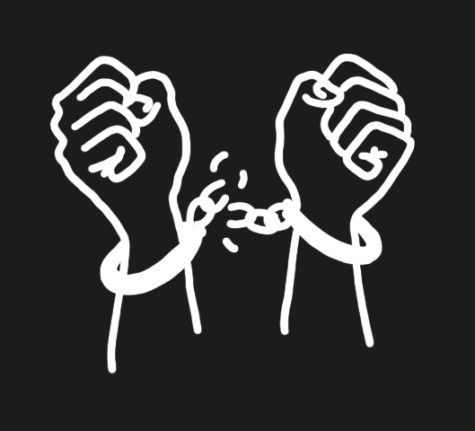OPINION | 13th Amendment’s great failure

(Maggie Pasterz)
Constitutional Amendments typically assure certain rights to Americans. The 26th Amendment, for example, mandates that all citizens over 18 years of age have the right to vote. The 15th Amendment prohibits discrimination on the basis of race or color. The 13th Amendment bans slavery and involuntary servitude and gives Congress the power to enforce that ban with legislation.
But the 13th Amendment has an exception.
The 13th Amendment allows slavery or involuntary servitude as a “punishment for crime whereof the party shall have been duly convicted.” Given that Black Americans are incarcerated almost five times as frequently as white Americans, it seems a closer look at this Amendment is in order.
The 13th Amendment was ratified Dec. 6, 1865 shortly after the end of the American Civil War: a war fought over a Black person’s right to exist as a free person in the U.S. Because it was passed so soon after Americans died to preserve slavery as an institution, one could argue that this exception is just a product of the time. Perhaps its authors believed that only criminals would become enslaved people.
But Black Americans are arrested far more frequently than white Americans, despite the fact that white Americans commit more crime overall than Black Americans. For example, consider the 1970s. In that time, a Black American was almost twice as likely to be arrested for a drug offense than a white American.
Today, Black Americans comprise about 27% of all arrested individuals in the United States — despite only making up approximately 12% of its population. This does not reflect a just system but simply where police are concentrated. This disproportionate presence is a residual effect from previous policies such as the war on drugs, which specifically targeted “Anti-war Left and Black people.”
In addition, Black people are more likely to be stopped by police. Because of that, Black people are also more likely to be arrested. And when these arrests are made, and people are imprisoned, the 13th Amendment is not there to protect them. What happens to these Americans?
In five states, including Texas — which has the largest state prison population in the nation — unpaid prison labor is still forced upon inmates. Texas state law requires its Department of Criminal Justice to use inmates, and their free labor, “as much as possible.”
In other words, inmates provide free labor for a for-profit prison system. The U.S. has shifted from plantations to prisons, where the slaves are in the custody of the justice system as opposed to a landowner. Texas Correctional Industries generated more than $70 million dollars annually while taking advantage of this slave labor.
Which is precisely why the 13th Amendment must be amended. Regardless of one’s status as an inmate or free person, they are still human. Forcing a human being into slavery is a cruel and unusual punishment, which is prohibited by the 8th Amendment.
The fact that modern-day slavery takes place behind closed doors and concrete walls does not excuse its existence. Until it is revised, the 13th amendment will exist as one of the greatest failures of the American justice system.
Your donation will support the student journalists of Tulane University. Your contribution will allow us to purchase equipment and cover our annual website hosting costs.



